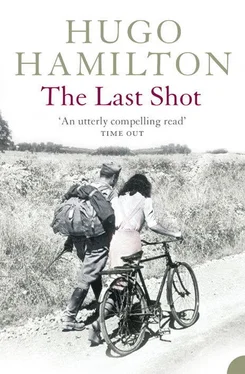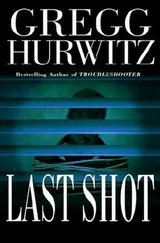‘I’ve thought a lot about luck,’ he said, as soon as Maria was gone.
‘I think we gave too much credit to luck, after the war. It really was made out to be something. We tried to make certain that we could make it a permanent thing; everyone worked hard to ensure that luck was stacked up for themselves. I mean, why should anyone have to be lucky to be alive?
‘Then they try to pass the luck on to their next of kin.’
He nodded at the door where Maria had gone out. He included himself in all his observations. He spoke freely, as though he had often spoken to me before, or as though he had been waiting for years to say this to me.
‘Idiots. Today we take luck for granted, here in Germany, and we don’t know what to do with it. I have never seen Germans so unhappy. This business with the Wall and German unity is not going to make them happier either. I see my own daughter, Maria, strangled by luck.’
Kern stopped talking and looked at me again for a long time, as though he hadn’t seen me for years.
I had come to ask him questions. I wanted to know about Bertha Sommer. What happened? He was going to tell me everything, honestly. Otherwise he wouldn’t have asked me to come. I knew he would unfold everything in his own way; he had nothing to hide. And there was no need to force anything.
I told him how the diaries of Bertha Sommer had come into my hands and how they ended abruptly after the war, in May 1945. She had taken them up again, years later, but they had become domestic, they talked about happy moments in her life, the linguistic charms of her children when they were small, locks of hair etc. But there were five attempts to write down what she called ‘something very painful’. Some agonizing memory which she could never get rid of or share with anyone. She had written it to her own children, a letter which was not to be opened until after her death, in which she wanted to unfold a ‘heavy secret’. But she never finished it. After a while she must have learned to suppress it.
‘When did she die?’ he asked, sitting up suddenly.
‘August the sixth, five years ago,’ I said.
‘I’m sorry.’ He stared at the floor for a while. ‘I never found out where she went. Where did she go?’
‘Vermont,’ I said. ‘She spent all of her life in America, living in Vermont. As far as I know, she came back to Germany once in the sixties, that was all.’
Franz Kern became even more silent and pensive.
‘So she got to America after all…’
I realized that Kern needed long pauses of silence to assimilate the information and the entirely new perspective it foisted on his life. I had given him an image of Bertha Sommer’s life which he had never imagined. He had thought of every other permutation of her life. He had wished her well as she drifted out of his memory.
‘Did she ever talk about the shooting?’ he asked.
‘She mentioned something.’
‘She wasn’t able to forget it,’ he said. Dreaming again. It was as though he was suddenly back in the past. ‘That’s what the heavy secret was. She couldn’t forget. Maybe if we were still together, she might have got over it. I couldn’t get it out of my head, either. I suppose we were afraid there would be a trial, an investigation. There was no need for any of that. It was a big mistake. All of it.’
He talked for a long time. Explained everything. The light faded outside. Another feeble wintry evening. Kitchen windows began to steam up everywhere in Nuremberg. TVs came on. Cartoons. News. Football results. People all over Germany sealed into their own luck.
‘It was a mistake,’ he said. ‘They were different times. Everybody had to get away with their own lives. Everybody had a duty to themselves. Every woman has a duty to be a woman. People like Bertha had a duty to survive. There was nothing for her to regret. She had nothing to hide. She was nothing but honesty.’
The phone rang. It looked as though Kern was going to ignore it. I asked if I should answer it for him. It was Maria. I called her Frau Jazinski, giving her the proper respect. She said she was coming over again to make an evening meal. I was welcome to stay and have something to eat.
There was a slight panic. There was a lot that Franz Kern and I had not yet discussed. He was still determined to keep his daughter out of all this.
‘There is no point in her asking me endless questions at this stage. It would turn the place into a war tribunal.’
‘How much does she know?’ I asked.
‘Nothing.’
I looked at him with some obvious surprise.
‘She knows about Laun. She knows that I fled from the Russians. That I saved a girl’s life. That I was involved in a skirmish with partisans and rescued a girl from certain death. My daughter is proud of me. As proud as you can be in this country…
‘But she knows nothing about Bertha. She doesn’t know that I loved Bertha. That I would have gone anywhere with her…That I was mad about her…
‘And I never told anyone that I killed two men long after the war was over. Well, maybe it was the twilight of the war. Maybe the war wasn’t over. Maybe it’s still not over.’
Kern stood up. He grimaced and said he had some pain in his leg that was tormenting him. He made a remark about being told by people that pain and pleasure were the same thing. He wasn’t convinced. He smiled and walked over to an antique bureau, unlocked a small, carved door and searched around for something. He held his stick pinned against the bureau with his knee.
‘I’ve never forgotten your mother,’ he said.
He came over and handed me a locket.
‘This used to belong to her. I think you should have it now. She gave it to me before she disappeared. I never saw her again. I had no idea where she went.’
I looked at the locket for a while. Kern switched on a low table lamp so that I could see better.
‘She got it in France, I think.’ Then he stood looking out through the window into the dark, beyond the reflection of the interior, the table lamp, the furniture of his own living-room, as though he could actually see something out there, as though he could see right back to the Fichtel mountains, to the lake, and the woods.
I handed the locket back towards him but he refused to take it back.
‘No. I want you to have it. I am glad you came. I wouldn’t like to have given it to anyone else.’
He stood looking out of the window or at the reflection of the room. I stood beside him. It was as though the two of us were looking at each other in a mirror.
‘Am I German or American? Or Polish?’ I asked, suddenly.
I regretted asking this almost as soon as I had said it.
‘You don’t have to answer if you don’t want to. I understand.’
‘I couldn’t answer that,’ he said, turning around. ‘I wouldn’t know. But it feels like talking to a son.’
I could see that it was all beginning to upset him. His eyes had become watery. I could see how old he was now. He reached out his arm to place it around my shoulder and I helped him back to his chair.
‘Now tell me about Vermont,’ he said.
He wanted to know everything. Every small detail. He asked me to tell him about myself, what I was doing. Where I was living. He saw that I was still holding the locket in my hand and told me to put it away before his daughter came back.
There were further pauses as he took the whole picture of Bertha Sommer’s life into his memory. It was as though her life had been lived out in an hour, while we were talking. He had spent his whole life searching for her in his imagination. He had settled for vague explanations, imaginary versions of her life which he could live with. It was as though she had suddenly come back to him. He would have to change his whole life again. He had to adjust his past; everything.
Читать дальше
Конец ознакомительного отрывка
Купить книгу












